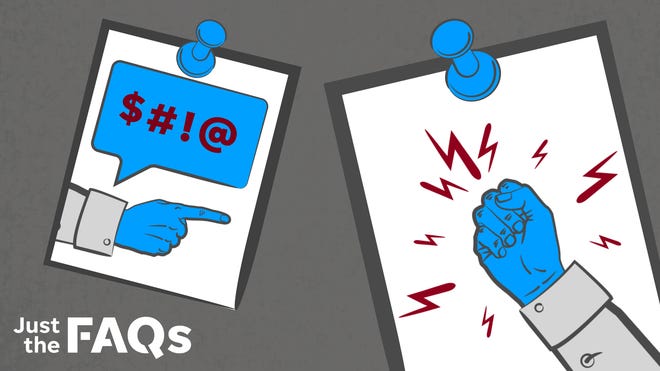
WASHINGTON – The Senate passed with overwhelming bipartisan support a hate crimes bill to address a drastic increase in violence and discrimination directed at Asian Americans during the COVID-19 pandemic.
The COVID-19 Hate Crimes Act cleared the chamber in a 94-1 vote Thursday. It would expedite the Justice Department's review of hate crimes andwould designate an official at the department to oversee the effort.
It also would task the department with coordinating with local law enforcement groups and community-based organizations to facilitate and raise awareness about hate crime reporting,including establishing an online hate crime reporting system in multiple languages.
The legislation, which now heads to the Democratic-led House, is one of the few bills to pass this Senate with support from both Republicans and Democrats. Many Democrats expected a legislative fight, but Republicans signaled early their willingness to compromise on the legislation, and senators from both parties have been negotiating for weeks.
Theexpanded legislation, spearheaded by Sen. Mazie Hirono, D-Hawaii,underwent several bipartisan changes before its final passage.
Speaking from the Senate floor Thursday, Hirono said that by passing the bill, "we will send a powerful message of solidarity to the AAPI community that the Senate won't be a bystander as anti-Asian violence surges in our country." AAPI refers to the Asian American and Pacific Islander community.
Both Senate leaders backed the bill.
"The vote today on the Anti-Asian Hate Crimes bill is proof that when the Senate is given the opportunity to work, the Senate can work to solve important issues," Majority Leader Chuck Schumer, D-N.Y., said from the Senate floor ahead of the vote.
More:In bipartisan vote, Senate advances bill on hate crimes against Asian Americans
Senate Minority Leader Mitch McConnell, R-Ky., said last week that as the “proud husband of an Asian American woman, I think this discrimination against Asian Americans is a real problem." McConnell is the husband of Elaine Chao, the former transportation secretary who was born in Taiwan.
One change to the bill from Sen. Susan Collins, R-Maine, with the backing of Hirono, helped broker and “broaden support” for the legislation by adjusting the bill's language in references of “COVID-19 hate crimes."
The adjustment helped reel in GOP support. Republicans had raised concerns that the first text was too narrow in defining the types of hate crimes.
The amendment would also have the Justice Department issue guidance “aimed at raising awareness of hate crimes during the COVID-19 pandemic.”
One other addition to the bill from Sens. Richard Blumenthal, D-Conn., and Jerry Moran, R-Kan., would establish grants to aid local and state governments to encourage more training on hate crimes for law enforcement, establish hate crime hotlines and allow for a "rehabilitation" effort for perpetrators of hate crimes.
The bill still needs to pass the House to make it to President Joe Biden's desk. It was going to be debated in the House Judiciary Committee on Tuesday, but its chairman, Rep. Jerry Nadler, D-N.Y., postponed that discussion until the Senate voted, meaning the legislation is unlikely to go to a full House vote for at least a few weeks.
“Addressing AAPI hate crimes remains a top priority for House Democrats. We are closely monitoring Senate deliberations, and we will take action on this issue soon,” said House Majority Leader Steny Hoyer, D-Md.
For more than a year, reports of hate incidents against Asian Americans have climbed.
Stop AAPI Hate, an advocacy group tracking hate incidents, said it had received nearly 3,800 reports of hate incidents across the country since March 2020, compared with roughly 100 incidents annually in previous years. It tracked 987 in the first two months of 2021.
After last month's mass shooting in Georgia that killed eight people – six of whom were women of Asian descent – lawmakers in both chambers of Congress pushed to expedite the legislation and called for quick action.
Another modification made to the legislation, as part of talks with Sen. Raphael Warnock, D-Ga., includesadding the names of those eight people killed.
More:Democrats work behind the scenes — and in public eye — to push against anti-Asian hate
Asian American lawmakers had introduced anti-hate legislation in the last Congress, but other than the House passing a nonbinding resolution condemning anti-Asian bigotry and discrimination during the COVID-19 pandemic, no legislation was signed into law.
Rep. Grace Meng, D-N.Y., a co-author of the legislation, said at a rally with Schumer on Monday that "we are finally taking action in Congress” after a year of discrimination that has made many in the AAPI community afraid to use public transit or even leave their homes.
The legislation is supported by Biden and the White House. The president said in March, “It’s time for Congress to codify and expand upon these actions – because every person in our nation deserves to live their lives with safety, dignity and respect."
Source link






